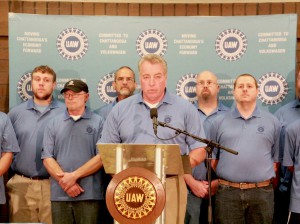
Gary Casteel, the UAW's Secretary Treasurer, said VW's recognition opens the door for discussions on any number of topics. (Photo credit: UAW)
The United Auto Workers expects Volkswagen’s recognition of the union at the company’s assembly plant in Chattanooga, Tennessee, will lead ultimately to a labor contract with the German automaker.
Gary Casteel, the UAW’s Secretary Treasurer and leader of the union’s organizing effort in Chattanooga, said Volkswagen’s recognition opens the door for discussions on any number of topics.
While a contract isn’t at the top of the list now since that would require formal legal recognition of the union by VW, but it certainly is a possibility in the not so distant future, Casteel said.
The contract with Volkswagen would be a first for the UAW in the South after more than three decades of failed efforts to represent workers at the transplants operated by Asian and European carmaker in South Carolina, Georgia, Alabama, Mississippi, Tennessee and Kentucky.
“Surely we’ll find the company has things they want to bring to the table. They’ve already told us that. This policy is a first step,” said Casteel, who was careful not to make any promises or raise any expectations, during a conference call with reporters.
“Our belief is that what’s good for the worker is good for the company,” he said.
Over time, as the idea of a union gains more support in the plant, the discussions are very likely to lead to some form of collective bargaining, Casteel added. However, he declined to speculate on how long the process might take to reach the point where contract negotiations could begin.
Volkswagen of American officials have noted privately the “Community Organization Engagement” policy put in place next month makes no mention of “collective bargaining,” a term that has legal connotations in the U.S.
Last month, Volkswagen outlined the special policy for the Chattanooga plant to satisfy the Volkswagen’s Global Works Council, which is led by representatives from the German metalworkers union.
(UAW defeats foes in Battle of Chattanooga. For more, Click Here.)
The so-called “Community Organization Engagement” allows any union that can prove it represents at least 15% of the carmaker’s workers the ability to meet with management on a regular basis and represent workers. It makes no mention of collective bargaining and contemplates separate unions, if they have employee support, vying for management attention.
The UAW has at least one rival group in Chattanooga: the American Council of Employees, which organized last summer to oppose any effort by the UAW to gain recognition in the plant.
The Volkswagen of America policy required the UAW to submit a list of workers offering to support the union. The UAW list was then turned over to auditors, who apparently checked a verified its authenticity to the satisfaction of VW, which could face the wrath of Tennessee’s Republican dominated legislature for allowing the UAW to gain a foothold in Chattanooga.
(Click Here for a first look at the new Mercedes-Benz GLE coupe.)
The policy also states at 15%, unions can use the company’s meeting rooms, post literature and meet monthly with Volkswagen management. At 30%, unions can also meet quarterly with a member of the Volkswagen Chattanooga executive committee and at 45%, the level at which the UAW now sits, a union can also meet every other week with Volkswagen’s management and executive committee.
Having reached the top tier, Casteel suggested the policy insures a relatively high level of engagement between the UAW and VW’s local management. The union’s success also is expected to create additional support among the VW hourly workers in Chattanooga.
While nothing is spelled out, the engagement and dialogue could lead to collective bargaining, which has specific meaning under the terms of the National Labor Relations Act.
(To see what three Ford vehicles are finalists for Car/Truck of the Year, Click Here.)
Conservative groups are expected to challenge the UAW’s presence in Chattanooga, but the law traditionally gives a company a large amount of latitude in accepting or opposing union representation of its employees. Right-to-Work law prohibits unions from forcing workers to pay union dues, but it doesn’t prohibit bargaining on wages and benefits.
VW’s policy also appears to have made it more difficult for front-line supervisors and superintendents, traditionally the most outspoken critics of labor unions in Southern plants. The supervisors in Chattanooga have been hostile to the UAW, but unions can now counter it out on the shop floor.

In my experience unions are only required if a company choses to exploit their labor force. Unions then end up being a counter balance for an out of balance employer-employee relationship.
There is absolutely no reason why any politician should oppose unions unless the union tips the balance to unreasonably favor employees. The Tennessee legislature should be ashamed of their unscrupulous political efforts to derail union representation at CHAT by knowingly spreading false claims about losses of jobs in a union is present. These elected officials should be prosecuted for these lies intended to dissuade CHAT employees.
In addition right-to-work laws are absurd and unreasonable when they are intended exclusively to be union busting legislation. How is it that a worker can have union representation in negotiations but not be required to pay union dues? This is unreasonable and unethical. Some states have used these bogus right-to-work laws to crush legitimate teacher unions and other unions.
We have overpaid, disingenuous politicians deciding how much teachers and state employees should be paid but no accountability for the politician’s salaries or unscrupulous acts. That’s a great system…
BTW, why are VW employee uniforms gray instead of blue like in Germany? VW’s corporate colors are blue/white AFAIK.
P.S. I am NOT nor have I ever been a union member.